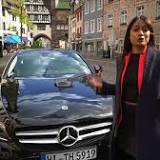China is eating Japan’s lunch when it comes to EVs so two of its biggest automakers have joined forces to avoid being ‘wiped out’

Chinese companies are dominating in electric vehicles, forcing some of the biggest automakers in the world to put aside their differences to face the threat.
Two of Japan’s biggest carmakers (and bitter rivals), Nissan and Honda, said Friday that they would work together to develop electric vehicles amid the looming threat of Chinese EV giants such as BYD.
Although the arrangement is unusual for Japan’s second- and third-biggest carmakers, Honda’s president, Toshihiro Mibe, said that the companies need to work together to survive the threat of new industry contenders, according to theFinancial Times.
“The rise of emerging players is becoming faster and stronger,” Mibe told the FT. “Companies that cannot respond to the changes will be wiped out.”
Nissan’s president and CEO, Makoto Uchida, added during a Friday joint press conference that the companies were short on time to step up their efforts, according to multiple outlets.
“It is important to prepare for the increasing pace of transformation in mobility in the mid-to-long-term, and it is significant that we have reached this agreement based on a mutual understanding that Honda and Nissan face common challenges,” Uchida said in a statement.
The Japanese carmaker partnership comes after Volkswagen and French car manufacturer Renault also said they may team up to bring an EV to market for budget-strapped consumers. To compete with the low-cost EVs coming out of China, Volkswagen’s CEO Oliver Blume said this week that it would be smart to work with other carmakers to put the costs “on more shoulders” and still make a profit.
It’s not just EVs where China is beating out its Asian neighbor. Earlier this year, China likely overtook Japan as the world’s top auto exporter thanks to a boost from its lower-cost gas-powered vehicles that made strides in countries such as Russia and Mexico, according to the China Passenger Car Association.
But China has a special advantage when it comes to EVs. Producing electric vehicles is more expensive than making gas-powered cars because of the lithium batteries EVs they use as well as the advanced technology they often come equipped with. China’s lower commodities costs and strong manufacturing capabilities have allowed it to produce lower-cost EVs, leading Chinese carmakers to rapidly expand their global market share over the past few years.
The European Union has accused China-manufactured electric vehicles of benefiting from state subsidies to outcompete other carmakers unfairly; the bloc is considering levying new tariffs. In the U.S., where China’s carmakers have made few inroads, they are hindered by a 27.5% tariff on EV imports.
In 2023, domestic EV sales in China jumped by 38%, or 9.5 million cars, according to the China Association of Automobile Manufacturers. China’s overall exports also surged by 58% last year to 4.9 million units, according to the trade association, thanks in part to EVs, which made up about a fourth of the exports.
In the final months of 2023, China’s star EV manufacturer, the Warren Buffett-backed BYD, surpassed Elon Musk’s Tesla for the first time to become the world’s leading EV maker by sales. In 2023, BYD sold 3.02 million cars, up 61.9% year-over-year.


 United Kingdom
United Kingdom Argentina
Argentina  Australia
Australia  Austria
Austria  Brazil
Brazil  Canada
Canada  Germany
Germany  Ireland
Ireland  Italy
Italy  Malaysia
Malaysia  Mexico
Mexico  New Zealand
New Zealand  Poland
Poland  South Africa
South Africa  United States
United States 





















